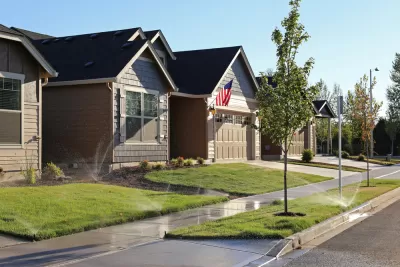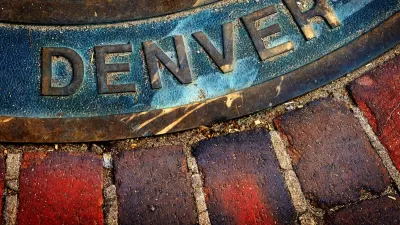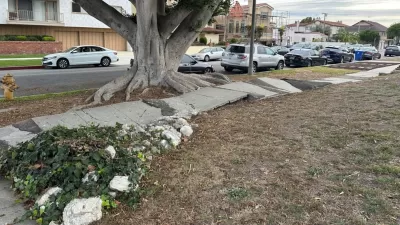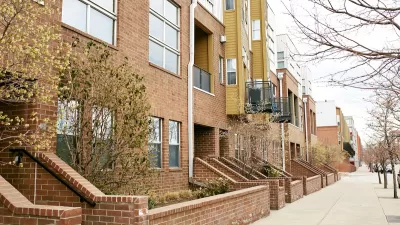Do cities that make homeowners repair sidewalks subsidize car culture? Or do cities that fund sidewalks subsidize sprawl?

After paying to fix the sidewalk outside his home in Jenkintown, Pennsylvania, walkability advocate Randy Garbin argues in CityLab that municipalities should fund sidewalk repair as part of regular public infrastructure maintenance.
Pedestrian infrastructure, he says, is too often neglected in favor of facilities that serve cars.
"The [Jenkintown] policy struck me as yet-another example of how towns and cities subsidize automobile usage and neglect walkability," he writes. "Freed from responsibility for its sidewalks, the town spends the money elsewhere, often on pedestrian-unfriendly projects."
Aaron Renn of urbanophile challenges that perspective, arguing that in some cases, privatizing sidewalk repair can further progressive urban values like walkability, density, and sustainability.
Particularly in suburban areas, he says, homeowners should bear responsibility for an improvement that "benefits [the homeowner] personally more than anyone else," rather than outsource the costs of unsustainable neighborhoods to municipalities.
"The best way to curb sprawl is to make these developments start internalizing their infrastructure cost," Renn writes. "Once these costs start becoming visible, change is possible."
FULL STORY: Where the Sidewalk Funding Ends

Alabama: Trump Terminates Settlements for Black Communities Harmed By Raw Sewage
Trump deemed the landmark civil rights agreement “illegal DEI and environmental justice policy.”

Planetizen Federal Action Tracker
A weekly monitor of how Trump’s orders and actions are impacting planners and planning in America.

How Atlanta Built 7,000 Housing Units in 3 Years
The city’s comprehensive, neighborhood-focused housing strategy focuses on identifying properties and land that can be repurposed for housing and encouraging development in underserved neighborhoods.

In Both Crashes and Crime, Public Transportation is Far Safer than Driving
Contrary to popular assumptions, public transportation has far lower crash and crime rates than automobile travel. For safer communities, improve and encourage transit travel.

Report: Zoning Reforms Should Complement Nashville’s Ambitious Transit Plan
Without reform, restrictive zoning codes will limit the impact of the city’s planned transit expansion and could exclude some of the residents who depend on transit the most.

Judge Orders Release of Frozen IRA, IIJA Funding
The decision is a victory for environmental groups who charged that freezing funds for critical infrastructure and disaster response programs caused “real and irreparable harm” to communities.
Urban Design for Planners 1: Software Tools
This six-course series explores essential urban design concepts using open source software and equips planners with the tools they need to participate fully in the urban design process.
Planning for Universal Design
Learn the tools for implementing Universal Design in planning regulations.
Jessamine County Fiscal Court
Caltrans
Institute for Housing and Urban Development Studies (IHS)
City of Grandview
Harvard GSD Executive Education
Toledo-Lucas County Plan Commissions
Salt Lake City
NYU Wagner Graduate School of Public Service





























